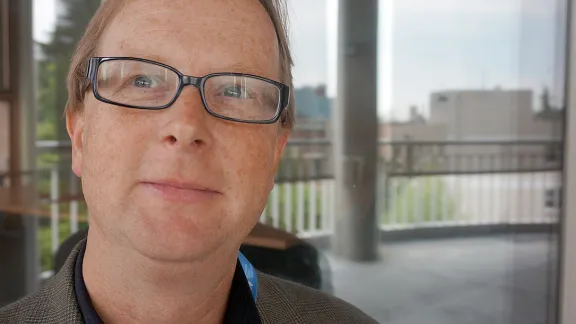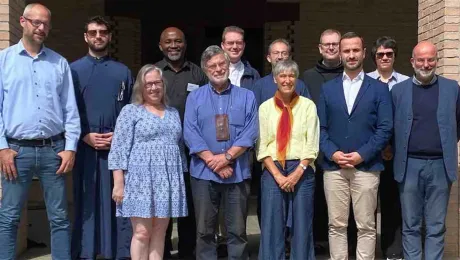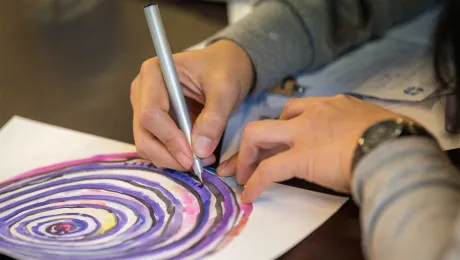
Dr. Michael R. Trice. Photo: LWF/I. Benesch
By Michael R. Trice
Seattle, 12 August 2014. The symposium titled “Religious Identity and Renewal: Jewish, Christian and Muslim Explorations” is off to a strong and inspiring start. Coorganized by the Lutheran World Federation and the Seattle University School of Theology and Ministry, our time together in Seattle is marked by exploring the themes of religious identity and renewal necessary for the twenty-first century.
We began promptly on Sunday evening with an insightful keynote presentation delivered by Dr. John Borelli, Special Assistant for Interreligious Initiatives to President DeGioia of Georgetown University. Borelli outlined nine signature challenges to religious identity in the current century, which included three false starts to religious dialogue. The final challenge focused on the rise of double- or multiple religious belonging, related but not limited to the increase in marriages between adherents of differing faiths.
Reflecting on mid-twentieth-century ecumenical and interreligious pioneers, Borelli noted how “The generation of pioneers is mostly gone . . . [and] the generation whom those pioneers instructed is nearing retirement. The ‘new generation’ has indeed had a different set of ecumenical and interreligious experiences. Our young people are more pluralistic, more comfortable with the benefits of a secular society, and are more global than ever before. We need to pay considerable attention to our spiritual companionship as Christians, Muslims and Jews because this will increasingly play a greater role in how our heirs will self-identify in the future.”
The symposium is divided into ten sessions, with panels of three scholar-practitioners per session. These scholars present on themes that include: The human response to God; the natures of emerging religious identity today; the authority of sacred scripture and divine revelation in our age; contemporary realities ranging from conflicts in the world to the restorative power of religious belonging; and the specific, demonstrated resources for deeper cooperative engagement in local and international contexts in the world today.
Monday included presentations by a Yemeni born rabbi who spoke of the Ethiopian Jewish experience, a postdoc of Islamic studies from Germany who assessed gender and a fresh hermeneutic for reading the Quran, and an Indian Dalit Lutheran theologian and bishop who discussed the restorative reality from creation as children of God. This last presentation sparked a conversation on divine love and human agency that disrupts the subjugation of human beings through caste (such as the Dalits) or structural bias on grounds of gender. Specific conversations followed each session, with scholars and practitioners exploring and applying themes to religious life.
I noticed a two-pronged pattern emerge in our conversation, which some scholars believe frames much of contemporary life. In the first prong of the pattern, we witness the breakdown of a traditional religious community’s own memory of its founding stories and rituals. Factors (ranging from external, regionally-based conflicts to internal arguments over core values) have the effect of a consequent harm to the religious community’s own relationship to its core narratives that shape daily life. Other examples, such as intermarriage, multiple belonging, or protracted internal arguments about who reads scripture authoritatively, certainly require a re-imagination of how we tell the story of who we are in the world. In short, protracted external and internal changes will transform religious identity and after some time we will have to align ourselves anew to our core stories or mission in the world.
A second prong in the pattern of contemporary life goes something like this: Through social media the world is saturated with fragments of quickly digestible video, commercial branding, cloud-based uploads, immediate text feeds, and the like. These serve as an emerging, quick-paced and vibrant constellation of often non-integrated stories that frame contemporary life. So, just as I may be losing the markers of my core religious identity, the world is awash with emerging stories available to me at any moment, and which provide new ways of understanding my place in the world. Instances of young Christian adults who care deeply for their own religious rituals and simultaneously live comfortably in a world where values are shaped without reference to religious belonging, is an example of my point. Another example includes my Bosnian Muslim friend whose son represents a second-generation within an immigrant community. His son is more comfortable living outside his community’s values in favor of the alternative sources I’m hinting at above.
There are no easy answers to the kind of dissonance in religious life that forms when we understand the impact of this pattern in daily life. Still, at the symposium I hear other examples of vibrant ecumenical and interreligious cooperation within the world. These include participation as co-religionists in protecting refugee rights, structural responses to assist immigrants, emergency response networks, and a shared slate of potential responses to ecological degradation that draws mightily from the values of stewardship from Muslims, Jews and Christians alike.
The symposium will continue through Thursday evening, and we will address all of the themes we’ve set before us. I am greatly encouraged by the commitment of those in the room who traveled across the world in order to engage in serious conversations about the nature of religious renewal today. This is not a simple array of conversations to have in such a short time, but the willingness to locate the markers of religious identity alongside our shared future, is certainly worth this effort.
Dr. Michael R. Trice, Ph.D. is a member of the Evangelical Lutheran Church in America, Assistant Dean for Ecumenical and Interreligious Dialogue and Assistant Professor for Theological Ethics and Constructive Theology at Seattle University, School of Theology and Ministry (STM) and a coorganizer of the interreligious symposium on religious identity and renewal.


